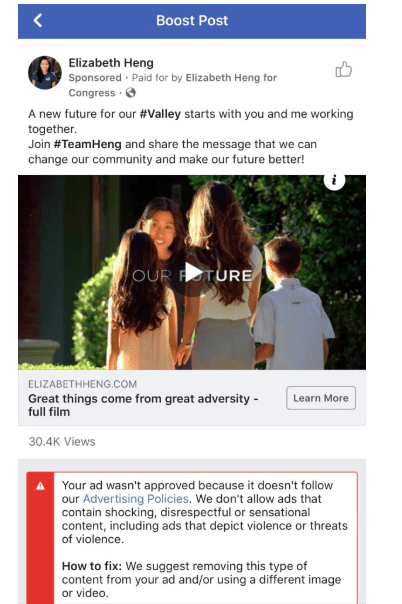Candace Owens: Enemy Of The Tweeple

This is such a 2018 story. The black conservative activist Candace Owens tweeted this:
Black people are only fit to live underground like groveling goblins. They have stopped breeding and will all go extinct soon. I enjoy being cruel to old black women.
The above statements are from @nytimes editor @sarahjeong. I simply swapped out the word “white” for “black”.
— Candace Owens (@RealCandaceO) August 4, 2018
https://platform.twitter.com/widgets.js
She tweeted at least one more horribly racist, obnoxious tweet that did nothing but replace the word “white” in Sarah Jeong’s tweets — and Candace Owens got banned by Twitter, until Twitter realized that she was making a point about their own outrageous bias.
For woke progressivism, some racism is virtuous, other racism, not. It’s like Comrade Lenin said, “Who, whom?” That is, the moral meaning of an act depends on who is doing it to whom.
Let’s have a look at this ad for Republican candidate Elizabeth Heng. TAC does not endorse any candidate or cause, and I preface this ad by cautioning you to watch it with the understanding that neither I nor TAC is saying you should vote for Heng. In fact, the relevant portion of the ad takes place in the first 30 seconds or so. Heng discusses how her parents came to America out of the killing fields of Cambodia. She features images of war in Cambodia — nothing particularly gruesome, but it does show historic black and white images of war:
[youtube https://www.youtube.com/watch?v=GUJXqJ4f_to]
You know what happened next, right?

Elizabeth Heng is a sort of un-Alexandria Ocasio-Cortez. Like her, she is a minority, female, young and charismatic and a first-time congressional candidate. But after that all comparisons end—and end dramatically in Heng’s favor.
Elizabeth grew up in a working-class neighborhood of Fresno, was a product of the Fresno public schools, and then went directly to Stanford where she became student body president. She later earned a MBA from Yale—all the while working on the Hill.
Unlike Ocasio-Cortez’s progressive complaints against the United States, Heng’s conservatism comes out of a deep appreciation for the sanctuary the United States offered her family and herself in overly regulated California to run T-mobile franchises with her siblings.
In sum, Heng is a highly-educated, well-informed conservative. Had she been a progressive, she would have received national attention as the “new face” of the next generation of congressional office-seekers, and courted by talk shows and the media. Yet she is running neck and neck with a seasoned Democrat pro in a year of the supposed “blue wave.”
Gosh, can’t have that. Block that woman!
What we’re seeing both with Twitter and Facebook is the cost to free speech and public discourse of allowing social media platforms run by those with woke progressive values to impose those values on the discourse. Of course every platform has to have standards, unless it’s going to allow itself to be a free-for-all (which comes with its own set of problems). The thing about Twitter and Facebook is those standards aren’t old-fashioned liberal, fair-play standards, but woke progressive standards, by which a different set of rules is applied based on race, gender, political affiliation, and so forth.
National Review‘s Reihan Salam, writing in The Atlantic, has a super-interesting take on this woke performativeness. Reihan is of South Asian heritage, for what it’s worth. Excerpts:
In some instances, white-bashing can actually serve as a means of ascent, especially for Asian Americans. Embracing the culture of upper-white self-flagellation can spur avowedly enlightened whites to eagerly cheer on their Asian American comrades who show (abstract, faceless, numberless) lower-white people what for. And, simultaneously, it allows Asian Americans who use the discourse to position themselves as ethnic outsiders, including those who are comfortably enmeshed in elite circles.
Think about what it takes to claw your way into America’s elite strata. Unless you were born into the upper-middle class, your surest route is to pursue an elite education. To do that, it pays to be exquisitely sensitive to the beliefs and prejudices of the people who hold the power to grant you access to the social and cultural capital you badly want. By setting the standards for what counts as praiseworthy, elite universities have a powerful effect on youthful go-getters. Their admissions decisions represent powerful “nudges” towards certain attitudes, beliefs, and behaviors, and I’ve known many first- and second-generation kids—I was one of them—who intuit this early on.
More:
And if you’re an Asian American aspiring to make the cut, even with the deck stacked against you, you might eschew complaining in favor of doing everything in your power to cultivate the personal qualities Harvard wants most, or at least to appear to have done so. One straightforward way to demonstrate that you are Harvard material might be to denounce Harvard as racist, provided you’re careful to do so in a way that flatters rather than offends those who run the university and are invested in its continued success. For example, you might reject the notion that affirmative action is the problem while arguing that Harvard shouldn’t endeavor to increase representation of rural and working-class whites, on the spurious grounds that all whites are privileged. That you’ll make these claims even though you yourself are hardly among the most downtrodden is immaterial: The important thing is to be interesting. What better way to demonstrate that you’re not a humdrum worker bee, afflicted with a lackluster personality, than to carefully and selectively express the right kind of righteous indignation?
I certainly don’t mean to single out Harvard. As the senior assistant director of admissions at Yale recently observed, “for those students who come to Yale, we expect them to be versed in issues of social justice. We encourage them to be vocal when they see an opportunity for change in our institution and in the world.” Picture yourself as an eager high schooler reading these words, and then jotting down notes. You absorb, assuming you hadn’t already, what it takes to make your way in contemporary elite America. And as you grow older, you lean into the rhetorical gambits that served you so well in the past. You might even build a worldview out of them.
Please read the whole thing. What Reihan is basically saying is that people like Sarah Jeong do what they do because it helps them to get ahead. One danger is they come to believe their own bullshit, because it works. Another danger is that once it breaks outside of elite circles, they “backfire,” says Reihan. Still, he says, these practices won’t stop because they are still so valuable at getting ahead in elite America.
It is interesting to consider, though, that the rest of America — well, outsider white America, especially white working-class America — is watching all this happen, and more and more understands that the whites in elite institutions are happy to see people demonized, and see their careers and their futures sacrificed. The woke who control the means of information dissemination actively seek to censor them, even as they promote favored minorities who demonize on racial lines. How can they protect their own interests, or even get revenge, given that they have little or no access to power?
Vote for You Know Who, and candidates like him.
I wonder: are these extremists pushing America to a Spanish Civil War-type situation, in which there is no middle ground, and you have to choose one side or the other, even though both are awful? From a message friend sent recently:
Ramon Serrano Suner, the brother in law of Francisco Franco, when asked “Why did the Spanish Civil War happen?” replied with “We just couldn’t stand one another.”
Subscribe for as little as $5/mo to start commenting on Rod’s blog.